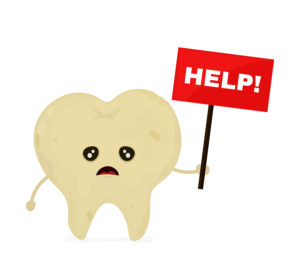16 Aug 3 Common Oral Health Problems and How to Prevent Them
 Benjamin Franklin said that “an ounce of prevention is worth a pound of cure.” This wise adage is true when it comes to preventing dental health conditions. Keeping regular checkups and cleanings with your dentist can help detect common oral health problems well before they advance. Treating early stages of dental diseases can save money along with precious oral tissue.
Benjamin Franklin said that “an ounce of prevention is worth a pound of cure.” This wise adage is true when it comes to preventing dental health conditions. Keeping regular checkups and cleanings with your dentist can help detect common oral health problems well before they advance. Treating early stages of dental diseases can save money along with precious oral tissue.
Following are three common oral health problems and helpful information on how you can prevent them.
Cavities
Some folks mistakenly believe that cavities only affect children. The truth is that tooth decay can affect people of any age.
Cavities require professional treatment because teeth cannot heal themselves. Most tooth decay can be prevented by adopting meticulous oral hygiene, visiting the dentist for regular checkups and cleanings, and moderating intake of sugary and acidic foods.
Gum Disease
Advanced gum disease is a serious oral health condition that can cause tooth loss and bone loss. Since gum disease is such a threat to your health, it is important to prevent its development with thorough brushing and flossing. Controlling plaque on your teeth and gums goes a long way to protect your gum health.
Fortunately, when gum disease is detected early on, it can be reversed. This is why it is important to have checkups and cleanings every six months. Dental cleanings help prevent gum disease, too, by removing surface debris. Tartar is calcified plaque that must be removed with instruments that dental hygienists use.
Dry Mouth
Dry mouth might seem like an annoying symptom, but having persistent dry mouth could increase your risks of developing common dental health issues.
Saliva is our mouth’s natural way to rinse away debris. When saliva production is diminished, it dries out the gingiva, which increases a person’s risks for developing gum disease. Saliva also helps dilute acids that can strip tooth enamel.
If you have dry mouth, it is important to discuss this symptom with our team, practice great oral hygiene, and drink plenty of water. We may also recommend mouth rinses to help keep soft oral tissue moist.
If it’s time for a checkup or cleaning, call our office today to reserve your appointment.


